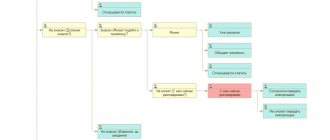2
Failure to pay utility bills can lead to dire consequences for residents of a municipal apartment. This may result in a shutdown of electricity and water, or eviction. It is also not easy to re-register ownership of a residential property with debts to housing and communal services; most likely, privatization will be denied to you. Are such decisions of the registrar legal, let’s find out.
Is it possible to privatize an apartment with a debt?
One of the mandatory clauses of the social tenancy agreement for municipal housing imposes obligations on the tenant to comply with the rules of living in the apartment and timely payment of utility bills. If at least one of these conditions is not met, the owner (local administration) has the right to unilaterally terminate the agreement and evict all tenants. In real life, these conditions are rarely met - rent arrears are a common occurrence, especially during a crisis. Only non-payers with a large debt - for six months or more - are subject to eviction.
The Law “On Privatization,” adopted in 1991, states that every citizen of the Russian Federation has the opportunity once during his life to exercise the right to free conversion of municipal housing into private ownership. It doesn’t say anything about the fact that debt for housing and communal services can cause a refusal, which means that if all other formalities are met, debts will not prevent you from completing the procedure and receiving an extract from the Unified State Register of Real Estate (a document confirming ownership of the apartment).
In practice, however, such failures occur all the time. Such actions of registrars should be regarded as arbitrariness (Article 19.1 of the Code of Administrative Offenses of the Russian Federation) and can be appealed in court. The problem can also be resolved peacefully.
Example. Citizen Smirnova A.N. decided to privatize her home for its subsequent sale, but she was unable to pay off the debt for heating that had accumulated over the winter due to temporary financial difficulties. The administration not only refused to accept her application, but also threatened to evict her. Smirnova consulted with a lawyer, who advised the woman to contact Teplofikatsia LLC to transfer the debt from the owner (municipality) to her name, and then reapply for privatization, which Smirnova did. An employee of the mayor's office, making sure that the rent debt was no longer registered with the municipality, gave the go-ahead for the procedure and after some time Smirnova became the full owner of the apartment. She eliminated the debt for housing and communal services after the privatization of housing.
Further actions
To appeal, it is necessary that the refusal be prepared in writing with references to specific legal provisions. If your application and package of documents were not even accepted, then this must also be done in writing. You must receive notification that documents were submitted but were not accepted.
Next, you will have to start preparing papers for the court: writing a claim, sending copies to the defendant, paying the state fee. To participate in the trial, you can hire a lawyer or represent your interests yourself.
The court can solve the problem in the following way: oblige the privatization body to accept the documents for consideration (if they were not accepted) or cancel its decision to refuse and oblige the government agency to conclude a privatization agreement with the plaintiff. The second case is that privatization through the courts is more preferable.
The procedure for privatizing an apartment with debts on utility bills
According to current legislation, the procedure for privatization of municipal housing is not at all affected by the presence or absence of rent arrears. The procedure is regulated by Federal Law No. 1541-1; unreasonable obstacle to re-registration is a gross violation. Such a decision can always be appealed in court.
Order
The main difficulty in re-registration of housing is the actual debts. Employees of government agencies are reluctant to give permission for privatization to persons who owe large sums to public utilities, so it is almost never possible without the participation of the court or prosecutors.
Procedure for registering ownership of an apartment:
- we identify all participants and ensure their attendance at all necessary authorities;
- We visit a notary office to formalize and certify waivers (if any);
- we order the necessary certificates from the Housing Office and the BTI (if the issuance of the requested document is refused, we require the refusal to be issued in writing);
- we write a complaint to the prosecutor’s office or restore justice in court;
- as soon as the violated rights are restored, we contact the mayor’s office with an application for privatization;
- we obtain a permit;
- we conclude an agreement with the local administration;
- we pay state duty for privatization;
- contact the territorial office of Rosreestr to complete the registration of property rights;
- We receive a paper or electronic version of an extract from the Unified State Register.
Procedure
Step-by-step instructions for the privatization of municipal housing with debts to housing and communal services:
Step 1. Prepare documents. To reduce the procedure time and minimize the likelihood of a refusal, you must carefully approach this stage. If one of the persons registered in the apartment refuses to participate in privatization, ask him to express his decision in writing and have the document certified by a notary. If already at this step the housing office or BTI employees do not issue you the required certificate due to debt, be sure to ask them to issue an official refusal in writing.
Step 2. We restore violated rights in court or the prosecutor's office (in case of an unlawful ban on privatization). You can choose a way to solve the problem yourself; the time frame for considering a complaint and conducting a legal battle will be approximately the same. If you proceed through the court, do not forget to pay the state fee.
Step 3. Submit documents. Having in hand an official document declaring the refusal to privatize invalid, we attach the remaining documents to it, write an application for privatization, and submit everything to the local administration.
Step 4. We conclude a privatization agreement. As soon as your application is reviewed and approved by the municipality staff, all participants in the procedure must simultaneously come to the mayor's office to conclude an agreement for the re-registration of housing and termination of the rental contract.
Step 5. We complete the registration in Rosreestr and receive an extract from the Unified State Register.
From this moment on, you can be considered the full owner of the apartment and dispose of it at your own discretion, within the framework of current legislation.
Statement
When privatizing an apartment with debts, at best two applications will be required, at worst three:
- To the local administration . It is written in free form, one from each participant, and must contain the full name and coordinates of the applicant, a description and coordinates of the residential property, as well as a request for permission to transfer it into personal property.
- To Rosreestr . A sample can be taken from the registrars; one copy is written from each participant.
- To the court or to the prosecutor's office. If privatization is refused, it is written by the main employer.
Features of drawing up statements of claim
You should approach the drafting of the document carefully; the text can be written in free form, but must consist of:
- names and addresses of the court (in the header);
- Full name and coordinates of the plaintiff (in the header);
- name and coordinates of the defendant - housing office, BTI or administration (in the header);
- descriptions of the problem, indications of a violation of the plaintiff’s legal rights, references to a regulatory act giving the right to appeal the refusal (Federal Law “On Privatization”);
- requirements for the court to declare the refusal invalid;
- list of attached documents;
- date and signature of the applicant.
In addition to the claim, you must provide the refusal received from government authorities, identification documents of the applicant, a rental agreement for municipal housing and other documents confirming the legality of your claims.
But keep in mind that if rent arrears have accumulated for 6 months or more, the municipality has the right to terminate the social tenancy agreement with the tenants, after which the latter cannot claim the occupied living space. In such cases, the courts, as a rule, side with the local administration.
An alternative to a lawsuit is a complaint to the prosecutor's office, where you can report a violation of current legislation by the Housing Office or BTI. Within 30 days, the application will be verified, after which justice will be restored and the perpetrators punished.
Unlike statements of claim, the decisions of which can always be challenged, a complaint to the prosecutor's office is filed once and can only be appealed in court, so it is more advisable to immediately go to court.
Required documents
In order to privatize housing with debts, you need to collect a package of the following documents:
- passports of all persons participating in the re-registration;
- notarized waivers (if any);
- cadastral and technical documentation for the real estate property being re-registered;
- certificates confirming non-participation in privatization;
- social rental agreements;
- personal account statements;
- extended extract from the apartment/house register;
- certificates of family composition.
Additional documents may be required, a detailed list, check with the mayor's office and Rosreestr.
Expenses
Despite the fact that there is no need to buy square meters from the state, since privatization in our country is free, you will still have to pay for some services, namely:
- state duty to the local administration - 2000 rubles for each adult participant;
- obtaining a technical plan from the BTI - 1000 rubles;
- extract from the Unified State Register of Real Estate – 200 rubles per participant;
- for notary services - according to the price list of the office;
- state fee to the court - 300 rubles (if the court takes your side, it will recover all legal costs from the defendant).
Deadlines
The Federal Law “On Privatization” allocates 60 calendar days for the procedure, but even without debt, rarely does anyone manage to meet the specified deadlines, since they do not take into account the time for collecting and preparing documents (from 14 to 30 days). If, due to debts, problems arise with the re-registration of property rights to housing and a judicial settlement of the dispute is required, then the period will increase by at least 2 months.
Certificates in form 7, 9
What kind of certificates are these:
- Certificate in Form 7 is an important document that is required for both privatization and real estate transactions. This certificate reflects the area of the apartment, data on redevelopment and other housing parameters.
- The certificate in Form 9 contains information about the number of registered ones.
Both documents are needed for privatization, but they are often simply not issued until the debt is paid. If officials block you from collecting documents for the privatization procedure, you can also appeal this to the prosecutor’s office. Certificates are issued through the MFC or at the passport office.
Reasons for refusals
Refusals due to the fact that employers do not conscientiously fulfill their obligations to pay for utilities are, unfortunately, not uncommon. Even though such decisions of registrars are illegal. Moreover, when re-registering housing, this problem is faced not only by malicious defaulters, but also by tenants with minimal debts to utility structures.
By issuing unfounded refusals of privatization to debtors, employees of government organizations hope that citizens, faced with difficulties at the initial stage of re-registration, will make every effort to quickly repay the debt. In practice, every year people increasingly prefer to solve such problems through the courts. The debt to municipal structures remains with the tenant. But it does not affect the procedure for re-registration of property in any way.
Example. Citizen Gromova began privatization with 4 months of rent arrears. Having received a refusal to issue technical documentation from a BTK employee and unable to repay the debt, the woman went to court to restore her violated rights. Having considered the case materials, the judge satisfied the plaintiff’s demands, and the apartment was successfully privatized. A few weeks later, Gromova found a buyer for the home. He agreed to purchase the property along with existing debts for housing and communal services, which is also not prohibited by law. Therefore, the purchase and sale transaction was successfully concluded. And the new owner successfully paid off the utility bills within a few months.
✅ What to do if privatization is refused?
So, we found out that municipal authorities and housing companies do not have the authority to refuse privatization of an apartment with debts.
What to do in case of refusal:
- Agree with the Management Company
Minor debt may be paid. Maybe not immediately, but over some time. The main thing is to agree on this with the company servicing the house. Usually they write an application addressed to the director of the management company or the chairman of the HOA with a request to provide a deferment or installment plan. It is profitable for companies to collect debt, so they meet the debtors halfway. Having agreed on the repayment of the debt, you can begin privatization - there will be no problems with obtaining certificates.
- Complain to the prosecutor's office
If you can’t come to an agreement and the Criminal Code continues to refuse to issue the necessary certificates, write a complaint to the prosecutor’s office about arbitrariness. Before doing this, you will need to take a written refusal from the housing company. The prosecutor's office conducts an independent investigation and issues its verdict.
- Go to court
You should not tolerate arbitrariness on the part of the Management Company. Applying to court with a statement of claim helps resolve the dispute in favor of the debtor. However, the debt will not go away. The tenant of a municipal apartment will be required to repay the debt after the privatization of housing.
If you have a large rent debt and are going to privatize your home, make a receipt to the management company or HOA to repay the debt after completing the procedure. Then you can sell the home, and the proceeds (for example, the buyer's advance) can be used to pay off the debt. For many defaulters, this is the only chance to pay off old debts (see “Is it possible to sell an apartment with debts on utility bills”).
✅ Documents
When privatizing an apartment with debts, applicants must prepare the following documents :
- copies of passports/certificates of privatization participants;
- notarial waivers (if any);
- powers of attorney (if needed);
- cadastral and technical documents for the apartment;
- extract from the Unified State Register of Real Estate – about non-participation in privatization, about the absence of other housing, etc.;
- a copy of the social rental agreement (or warrant);
- BTI conclusion on the condition of housing;
- an extract from the EIRC on the personal account (about the absence of debts);
- certificate of persons registered in the apartment;
- other documents.
If you have debts, it is difficult to obtain certificates from the EIRC and BTI. You will have to go to court with the available documents. The missing certificates can only be obtained after a judicial review of the case.
Read what documents are needed to privatize an apartment according to the general procedure?
✅ Advice from a lawyer
Finally, here are some useful tips :
- Contact the management company and ask to pay in installments or defer the debt for the apartment. Almost always, residents are met halfway (with the exception of persistent defaulters). All that remains is to write a receipt, sign and receive the missing certificates for privatization. This method is suitable for those who have small debt.
- Tenants of apartments with large debts can exchange or sell a privatized apartment. But you need to convince the management company that the debt will be repaid. For example, write a receipt that part of the amount will be paid from the advance payment of the buyer of the apartment.
- Rent arrears over 3 years are subject to the statute of limitations. The tenant will not have to pay debts for a period beyond the specified period. It is enough to pay off the rent debt for the last 3 years. But there is no need to rejoice ahead of time - debt for a municipal apartment for a period of more than 6 months is grounds for eviction of a person - by virtue of Art. 83 Housing Code of the Russian Federation. In this situation, there can be no talk of any privatization.
- It is allowed to sell an apartment with the transfer of the debt to the new owner of the property (Clause 2 of Article 391 of the Civil Code of the Russian Federation). However, this only works with the consent of two entities: the buyer of the apartment and the local administration. As a rule, the unpaid amount or part of it is included in the price of the apartment being sold (see “Purchasing an apartment with debts for housing and communal services or major repairs”).
To summarize, it should be said that privatizing an apartment with debts on utility bills is a rather troublesome undertaking.
Employees of housing departments may refuse to issue the necessary certificates. You can protect your rights in court. But it is better not to bring the situation to the “boiling point”, but to begin gradually repaying the debt. We recommend that you contact the lawyers of our portal and consult on any questions you may have. Attention!
- Due to frequent changes in legislation, information sometimes becomes outdated faster than we can update it on the website.
- All cases are very individual and depend on many factors. Basic information does not guarantee a solution to your specific problems.
That's why FREE expert consultants work for you around the clock!
- via the form (below), or via online chat
- Call the hotline:
- 8(800)302-39-65
— All residents of the Russian Federation - +7(495)128-69-80
— Moscow and the Region - +7(812)509-13-65
— St. Petersburg and region
- FREE for a lawyer!
By submitting data you agree to the Consent to PD Processing, PD Processing Policy and User Agreement.
Anonymously
Information about you will not be disclosed
Fast
Fill out the form and a lawyer will contact you within 5 minutes
Tell your friends
Rate ( 2 ratings, average: 5.00 out of 5)
Author of the article
Maxim Privalov
Lawyer. 2 years of experience. I specialize in civil disputes in the field of housing and family law.
Author's rating
Articles written
614
✅ Complaint to the prosecutor's office
In the section above, we found out that failure to issue certificates due to debts for an apartment is a violation of the current privatization regulations. The applicant has every right to file a complaint with the prosecutor's office. This can be done online in the “Internet reception” section - it is available on the website of any city prosecutor’s office.
The period for consideration of complaints from citizens in the prosecutor's office is from 14 to 30 days . The return response will contain information about the further fate of the case. If the prosecutor's office reveals violations in the actions of employees of the housing office, homeowners' association or BTI, they face an administrative fine in the amount of 300 to 500 rubles (Article 19.1 of the Administrative Code).
Please note that you can submit a complaint to the prosecutor's office only once . Therefore, if you are refused consideration, a repeated complaint will not be accepted. That is why lawyers advise immediately going to court with a statement of claim.
✅ Cost
The costs of privatizing an apartment with debts are minimal. There is no need to pay for the purchase of real estate from the state. Privatization of an apartment is considered a free procedure. Separate costs are associated with paying state fees and obtaining certain certificates.
The cost of state duty is 2,000 rubles per adult (children do not pay). Total costs for certificates – from 1,000 rubles. Notary services - according to the price list depending on the region of residence.
Additionally, you will have to pay a state fee for filing a claim in court - 300 rubles. However, you can recover this amount from the losing party of the case - the management company, the HOA or the administration.
✅ Deadlines
The legislation allocates 2-3 months for the privatization of housing. True, in our case the procedure will certainly drag on. In addition to the specified period, time will be required to consider the case in the district court/prosecutor's office.
The approximate time frame for privatizing an apartment with debts is 2 months + 14-30 days . Usually everything takes from 90 days or more, in general up to 6 months.
For more details on how the terms are calculated, see our article “How long does it take to privatize an apartment?”









